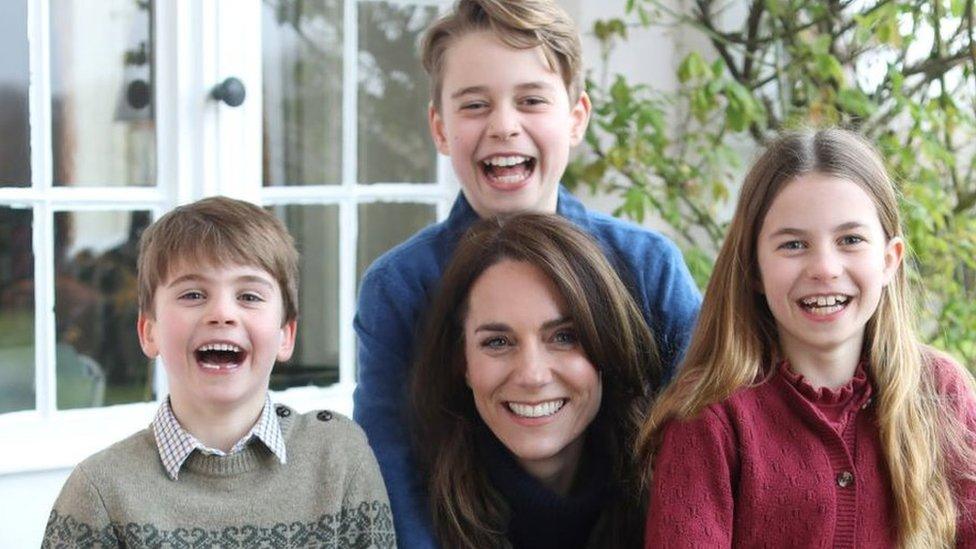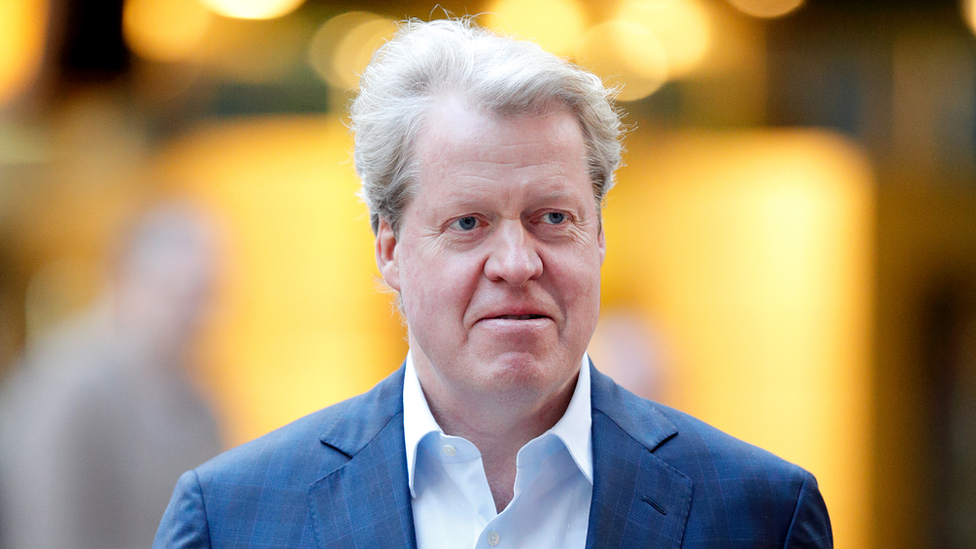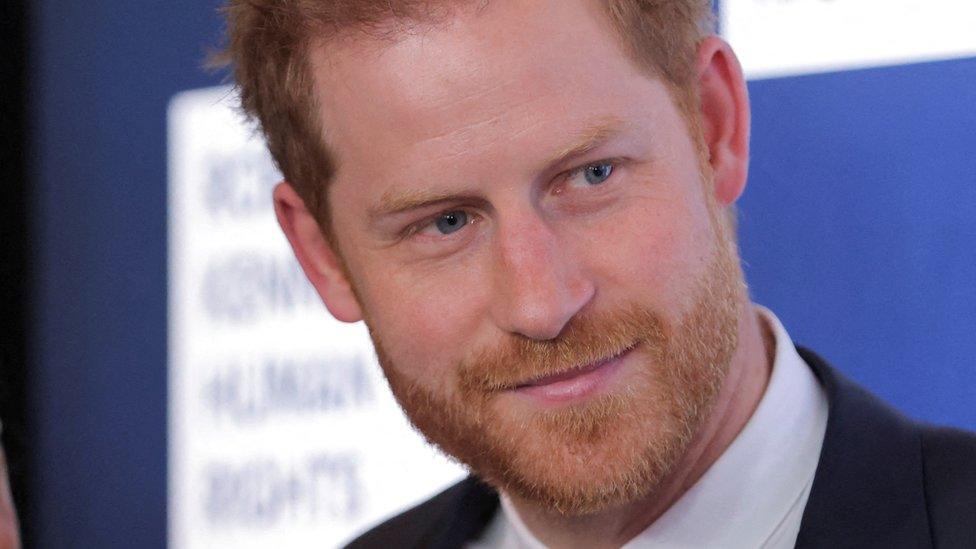Diana's brother says her press attention more dangerous than Kate scrutiny
- Published
Charles Spencer said press intrusion used to be "worse"
Princess Diana's brother, Earl Spencer, has told the BBC that press attention suffered by his sister was "more dangerous" than the scrutiny surrounding the current Princess of Wales.
But, in an interview to broadcast on Sunday with Laura Kuenssberg, he also said he worries about "what happened to the truth", amid conspiracy theories about Catherine.
He also told me about violence he and his sister suffered at home. As children, he and his sister Diana were punished by a nanny in "painful" ways, he said.
He has just written a book, A Very Private School, about the shocking levels of violence and sexual abuse that he suffered as a young boy when he was sent to boarding school at the age of eight.
Re-living the experience led to him suffering a breakdown and receiving residential treatment for trauma, but he is resolute abuse victims "must speak out".
Earl Spencer, one of the most prominent aristocrats in the country, said "damaging violence to children" affects them, whatever family they are born into.
He is perhaps best known for his criticism of the press after his sister's death in 1997, when he gave a controversial speech at her funeral, promising to protect William and Harry from the kind of intrusion their mother received.
The earl is loath now to talk specifically about the pressures on his two nephews and the rift between them. But after weeks of speculation online about the health of the current Princess of Wales, I asked if he thought today's pressures were more potent.

Sign up for the Off Air with Laura K newsletter to get Laura Kuenssberg's expert insight and insider stories every week, emailed directly to you.

He told me the situation had been more risky for Diana, saying, "I think it was more dangerous back in the day."
Diana died when her car crashed as it entered an underground tunnel in Paris while it was being pursued by photographers.
"I think, if I look back to '97 and Diana's death, I think that was so shocking too - the circumstances of her death were so shocking, that it did make the industry that supports the paparazzi really consider more carefully what it could and couldn't do," he said.
"Not because they had a moral judgement, but because it was unacceptable to the public."
Looking back, Earl Spencer now thinks he used to take on the press, most famously through a powerful and eloquent eulogy at Diana's funeral, because he had "an absolute hatred of injustice" influenced by his treatment at school.
Following weeks of conspiracy theories about his nephew's wife, Catherine, he added: "I do worry about what happened to the truth."
Earl Spencer, Diana's younger brother, told me at length about the regular beatings and grooming he says he experienced as a child at the hands of staff at Maidwell School.
He has alleged in his book that a female member of staff groomed and abused him and other young boys in their dormitory, and also that the school's then headmaster, John Porch, inflicted "brutal beatings".
The earl explained he did not tell anyone at the time about the abuse due to the "biggest unwritten rule" at the school being "don't tell tales."
Maidwell School said in a statement: "It is sobering to read about the experiences Charles Spencer and some of his fellow alumni had at the school, and we are sorry that was their experience.
"It is difficult to read about practices which were, sadly, sometimes believed to be normal and acceptable at that time. Within education today, almost every facet of school life has evolved significantly since the 1970s. At the heart of the changes is the safeguarding of children, and promotion of their welfare."
Earl Spencer's childhood experiences have left him feeling strongly about children being sent to boarding school before they hit puberty.
"I don't think it's fair," he said. "I would never send any of them [his children] away... I couldn't have done it to them."
In our interview, Earl Spencer also revealed he and his sisters suffered violent punishments at home as young children.
He said one of the nannies that looked after him and Diana, named in his book as Nanny Forster, "used to crack our heads together, if we were both found to have done something naughty, obviously without my father's knowledge, but it really hurt".
Watch: Diana's brother Earl Spencer says nanny 'cracked our heads together'
"It wasn't a tap on the wrist," he said, "it was a cracking crunch, you know, and I remember it still."
Earl Spencer told me he doesn't blame his parents, who "did their best, like 98% of parents do". But his treatment highlighted the "disconnect" between parents and children in some aristocratic families, he said.
Another nanny, who looked after his older sisters, but not Diana, used laxatives to punish them, he told the BBC.
"A different nanny was punishing them by ladling laxatives down them, and my parents couldn't work out why they were constantly ill."
There is no question that the levels of abuse and violence that Spencer suffered at school were appalling.
Hearing his testimony in person was both compelling and uncomfortable, especially to discover that he and his sisters had also sometimes been hurt at home by people employed to care for them.
But there was also something incongruous to hear about his brutal experiences in the lavish surroundings of one of the most exclusive addresses in London, Spencer House. It is a property built for his aristocratic ancestors in the 18th Century, with glittering chandeliers, priceless art works and - quite literally - gilded walls.
BBC speaks to Princess Diana's brother, Earl Spencer
There is little sense that Spencer is looking for sympathy. He seems to be seeking to tell his story for himself, almost as a form of therapy, and on the behalf of others who suffered the same kind of abuse.
He is clearly aware that other children from all walks of life suffered in silence all too often in that era.
Yet speaking to him reveals the specific pressure of keeping terrible secrets in the name of the English aristocracy's so-called "stiff upper lip". The expectation to carry that tradition down the generations was intense, even if it meant small children suffered, or were even in danger.
Perhaps privilege is no protection from violence or abuse, nor, as the world witnessed through his sister's troubled life, any guarantee of being happy.

If you've been affected by the issues in this story, help and support is available via the BBC Action Line
- Published12 March 2024

- Published10 March 2024

- Published6 March 2023

- Published31 August 2017